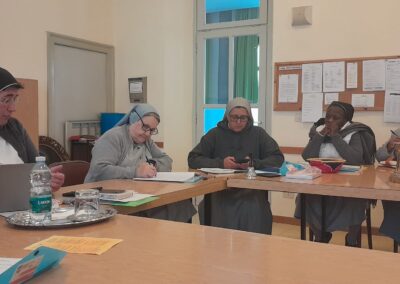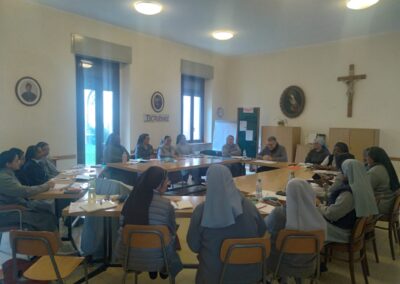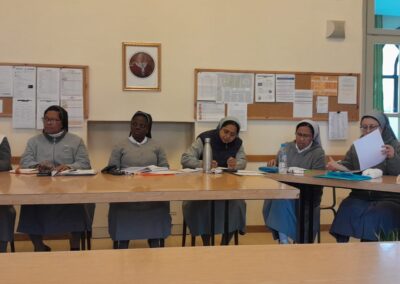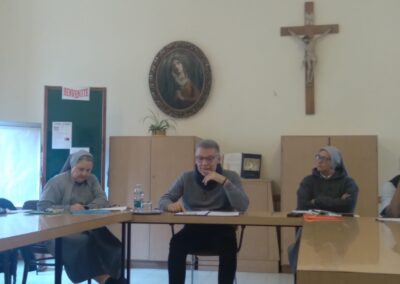Testimony of Mother Tina as told by Sr. Leny
In Vimercate, the historic home of the missionary sisters, the quarterly meeting dedicated to the sisters under 55 years old was held: 20 sisters from 8 different countries gathered together, coordinated by Mother Tina and Mother Isabel, the leaders of the European Delegation. Mother Tina opened the session with a warm welcome, especially to the three Indian sisters and the Congolese sister who were attending the meeting for the first time.
She then explained the purpose of the meeting: to be a single group, yet one characterized by different languages and cultures.
The meeting aimed to provide the Sisters with a precious moment of formation where they could listen, pray, and share something that would energize their consecrated lives and give momentum to the mission that God has designed for each of them. Mother Tina concluded by outlining the three days of this seminar, which were centered on:
• Jesus Christ, the Greatest Love
• Fraternal Life, a Privileged Place for Formation
• Relationships: with others and with the digital world.
She emphasized the importance of rooting one’s life on a solid foundation, our firm foundation, which is Christ Jesus. Each Sister is called to make Jesus more and more the center of her life and the heart of her being, so that she can share the joy of being called and chosen by Him and convey it in everyday life, reaching out to everyone she encounters.
Let us build our lives on the rock that gives us freedom:
JESUS CHRIST, “THE GREATEST LOVE”
Testimony of Father Maurizio (Franciscan) as told by Sr. Anne
The first meeting began with a question from Father Maurizio: “I love, but why?”
Today, in a context of great change, the Church—founded on faith in Jesus, the Greatest Love—listens to the rapidly changing times that create trauma in the lives of men and women today. The Church feels called to take on a merciful face, drawing close to suffering humanity.
This difficult global context generates in each person a desire for change, born from reflection on reality. Indeed, such a change in era presupposes a change in ideas. The experience of Christian faith is no longer tied to form or law but to the purest experience of love, which makes us capable of feeling an affection in which we are not strangers to one another.
At this stage, we are called to descend into the depth of our fragility to change it, because Jesus, who became incarnate to heal human fragility, is met precisely by plunging into human misery. Jesus wants to transform the experience of the people through the Church, a Church that no longer needs buildings or houses, because we, the people, are the Church. The temple has been replaced; the temple is no longer an architectural building but the body of Jesus, the person of Jesus.
The glory of God is not a church. It is not a cathedral, not even St. Peter’s. When Jesus places us before these challenges, we struggle, we oppose them.
We continuously go to church and delude ourselves into thinking we live our relationship with God by going to church, but in this afternoon phase of Christianity, we are called to descend deeply, beyond all that is superficial.
Today, the challenge of faith is to evangelize religion. Spirituality is to descend deeply, overcoming all that is superficial. Spirituality means accepting the experience of Love that makes us capable of loving, that makes us attentive to our brothers and sisters. The other, in their complex diversity, becomes a temple, and the temple reveals God. Without fraternity, there is no salvation.
We must be reborn from above, letting ourselves be generated by that love, for nothing, except love, can save us. Becoming worshippers in Spirit ends the cult of the temple and keeps us away from non-Christian spirituality.
The true path that leads to God is the path of fraternity: that is why the path of synodality is universal. Christ, the greatest Love, teaches us to live our relationships with respect; He does not judge but accepts all; He is the companion of life for all. The love of Jesus is a healthy love. And healthy love is one that involves oneself, the other, and the Other, uniting these three persons. To love oneself is closely linked to self-knowledge, to savoring life, to being able to be moved, to enjoying everything. The desire to be loved is tied to the desire to know oneself, so as not to be spectators of life.
Prayer opens us to love, but the community makes us aware of whether our life is authentic or not. Let us allow the Holy Spirit to drive us to grow. The other, the neighbor, is an exercise in reality. We must have the courage to stay on the path. Love is something inconvenient for us, but we must let diversity be embraced within us in order to make a difference. When someone loves me, observes my Word, let us be drawn to this life. May our lives be a continuous growth, with the poor as instruments to help us love, making us more human. Let us learn the life of gratuitousness.
Without this path of liberation, we can fall into the pharisaism with which the Lord struggled all His life. The greatest sin is division. The steps for this path of conversion and fraternity may be: filial relationship with Christ, listening to the Gospel with the heart. A path of conversion toward the Gospel (Fratelli Tutti). Differences must be loved.
“FRATERNAL LIFE: A PRIVILDGED PLACE FOR MY FORMATION”
Testimony of Sr. Renata (Ursuline), as told by Sr. Elizabeth
Drawing from biblical texts such as 1 John 3-4, excerpts from Fratelli Tutti by Pope Francis, and the lives of some saints (the Desert Fathers, St. Anthony, St. Thérèse), Sr. Renata reflects on fraternal life. I would like to highlight some insights:
Community life “obliges” me, calls for truth, authenticity, to experience the gift. When I am proactive, receptive to its richness, the relationship between the members becomes something new and good. On the other hand, when I remain rigid, wanting to “do justice” or remain closed, not opening my ears, the result is sadness, isolation, and discomfort. What are the tools for safeguarding fraternal life?
• Self-formation, that is, permanent formation
• Vigilance
• Prayer
• Humility
• Respect
• Attention to others and to God
• Humor
• Quality of relational spaces
• Dialogue
• The need to make personalized journeys within communities, to move from seeing to looking; from hearing to listening. The need to stop and evaluate our fraternity and our activity. Thinking of the Gospel passage about wine and new wineskins or the document for the consecrated persons with the same title, we feel called to continually enrich our charism and form of consecration and to have the courage to pause and evaluate what still responds to the Gospel and what does not.
• Rethinking the style and manner of living authority. One that fosters communion and subsidiarity, where everyone is active and co-responsible. In numbers 41-46, it talks about the importance of shifting from the centrality of authority to the centrality of fraternity.
To grow more in the sense of belonging, it may be helpful to ask ourselves: What style of fraternal life exists in my community? By simplifying structures, what could be changed in my community?
• Let us learn to be creative, flexible, and elastic women. Ask ourselves what is expected of the community, whether what we desire is right, possible, or is something more self-referential. Ask when we are best able to interact within our community, if we are aware of the contribution we can give to build fraternity… ask ourselves when we are given “small gifts” among ourselves.
Ask what we feel has the most weight in fraternity and try to share where each one is, so that we can open our hearts to the place where the other is.
• Avoid the great danger of judgment. Give a name to what we carry within us, safeguard the thoughts that dwell in us. Stay face to face with Jesus, helping us not to be dominated by our instincts but by the Spirit. Like St. Thérèse, “What do I do with what I do not love?” Alone we cannot, but with Jesus, we can go forward and always win. “Without Me, you can do nothing” (John 15).
In the end, how can I ensure that everything forms me? Remember that I am called to love always. And that the heart never grows old when there is love.
“NOW IT IS OUR TURN: MY PERSONAL RELATIONSHIP WITH THE DIGITAL WORLD
Testimony of Sr. Antonella Rocca as told by Sr. Imelda Coimbra
Before beginning the evening of sharing, Mother Antonella showed us the film about the birth and rise of Facebook, The Social Network. The main themes of the film were:
• Ambition and innovation: the film explores Zuckerberg’s genius and his determination to turn an idea into a global empire.
• Friendship and betrayal: the relationship between Zuckerberg and Eduardo Saverin deteriorates due to financial and personal differences.
• Ethics and power: the film raises questions about morality in the business world and the competitive nature of Silicon Valley.
The film is set in 2004, when Zuckerberg, a student at Harvard, created a site called FACEMASH, a tool that allowed students to vote on the beauty of the photos of their university classmates.
After the screening, Sr. Antonella led us to reflect on the relationship between our community and digital communication in this time, urging us to ask what social media can mean in religious life. We understood how the way we communicate and evangelize are fundamental elements of relational life in the community.
She then introduced us to Kolb’s Cycle, named after its creator David Kolb. It is a model of experiential learning that emphasizes the role of experience in the learning process. It consists of four stages:
1. Concrete Experience: the stage in which a new experience is lived directly or an old situation is re-experienced in a new context.
2. Reflective Observation: the stage in which we reflect on the experience, observing and analyzing what happened.
3. Abstract Conceptualization: the stage in which abstract concepts are formed, and theories are generated based on reflections. It is when we begin to theorize and understand the causes and effects of the experience.
4. Active Experimentation: the final stage in which new theories and ideas are applied in practice, putting the concepts learned into new experiences.
The cycle is continuous and circular, allowing constant improvement and adaptation through experiential learning. This model is considered effective because it acknowledges that learning occurs through a balance between practical experience and theoretical reflection.
St. Magdalene of Canossa, who lived from 1774 to 1835, saw communication as a fundamental means of spreading the Christian message and helping the needy. Her drive was expressed even without the presence of social media or modern communication networks. Her vision of communication was deeply rooted in personal relationships and direct interaction with people and her sisters. She believed that education and social promotion were essential tools for improving people’s lives, especially those of women and the poor.
Magdalene used interpersonal communication to build trust and convey Christian values through education and assistance. Her ability to communicate effectively with both people and her sisters, inspiring them to follow her example, was crucial to the success of her charitable works. Interestingly, at a time when digital communication didn’t exist, St. Magdalene of Canossa had already created an intense communication network with her sisters, based on letter exchanges that responded to the questions of each sister in different communities—writings that were later collected into a kind of early social network. The Epistolary, the Memoirs, the Diffused Rule, the Rule of Life, the Spiritual Writings, the Plans, the letters to Don Libera. These sources testify to how important communication was to Magdalene of Canossa, according to the methods of her time.
In conclusion, St. Magdalene of Canossa saw communication as an act of love and service, based on personal and direct relationships rather than technological means





